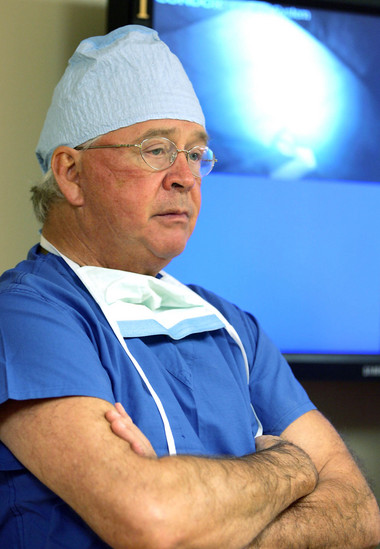Take note, this article is NOT about volleyball but athletes and sports in general.
Surgeon Dr. James Andrews wants to convince parents that pushing their children into year-round sports can be dangerous to the youngsters’ health.
In order for you to understand more where he’s coming from, here are some excerpts from his interview by Dennis Manoloff, The Plain Dealer (PD), and published on cleveland.com.
PD: Why the spike in youth injuries?
J.A.: Multiple factors, but two stand out: specialization and what we call professionalism.
Specialization leads to playing the sport year-round. That means not only an increase in risk factors for traumatic injuries but a sky-high increase in overuse injuries. Almost half of sports injuries in adolescents stem from overuse.
Professionalism is taking these kids at a young age and trying to work them as if they are pro athletes, in terms of training and year-round activity. Some can do it, like Tiger Woods. He was treated like a professional golfer when he was 4, 5, 6 years old. But you’ve got to realize that Tiger Woods is a special case. A lot of these kids don’t have the ability to withstand that type of training and that type of parental/coach pressure.
Now parents are hiring ex-pro baseball players as hitting and pitching instructors when their kid is 12. They’re thinking, ‘What’s more is better,’ and they’re ending up getting the kids hurt.
PD: Is money at the root of the problem — e.g., the pursuit of college scholarships or pro contracts?
J.A.: The almighty dollar has a lot to do with it, yes. Some parents are putting a football or baseball in their kids’ hands when they’re 3 years old, and it’s not just for a fun little photograph. Parents are projecting 10, 12 years. Don’t get me wrong, I’m for sports. I love sports. I want these kids to reach their full potential, and if the potential is a college scholarship, great. If it’s a pro career, great. But to think they’re all going to be professional athletes is misguided. The odds against it are so very, very high. Even the ones who get college scholarships comprise a much smaller percentage than parents think.
PD: The best advice you would give parents of a young athlete?
J.A.: The first thing I would tell them is, their kid needs at least two months off each year to recover from a specific sport. Preferably, three to four months. Example: youth baseball. For at least two months, preferably three to four months, they don’t need to do any kind of overhead throwing, any kind of overhead sport, and let the body recover in order to avoid overuse situations. That’s why we’re seeing so many Tommy John procedures, which is an adult operation designed for professionals. In my practice now, 30 to 40 percent of the ones I’m doing are on high-schoolers, even down to ages 12 or 13. They’re already coming in with torn ligaments.
Give them time off to recover. Please. Give them time to recover.
I said in the book, I want parents and coaches to realize the implications of putting a 12- or 13-year-old through the type of athletic work done by a 25-year-old. Parents and coaches, though they mean well, need to understand what the long-term effects of overuse can be.
PD: Which is the more complicated surgery, torn ACL or Tommy John (injured elbow ligament)?
J.A.: Even though they involve different parts of the body, they are similar surgeries. I’ve called Tommy John the ACL of the elbow. Throwing a baseball at 90 miles an hour with a reconstructed elbow is equally as impressive as a running back coming back from an ACL tear.
PD: Have you ever needed to tell an athlete after surgery that it doesn’t look good?
J.A.: My rule is, the glass is half full, not half empty. One of the things you don’t do is wake up an athlete in the recovery room and say, “That’s the worst injury I’ve ever seen, and you’re not going to make it back.” You’ve got to be positive. I told Drew [Brees]: “I could do your operation 100 times and probably couldn’t do it as well as I did it today. You are going to get through this, and you will be better than ever. Now go to work.”
At the same time, you have to be realistic. When you get to a certain point where you know they’re not going to be able to make it, you let them down slowly. You don’t tell them right away. You gradually work it in. As you get to know them better, you gradually let them know there is life after football.
Click here to read the full article.
(source & image: cleveland.com/ No Copyright Violation Intended)


